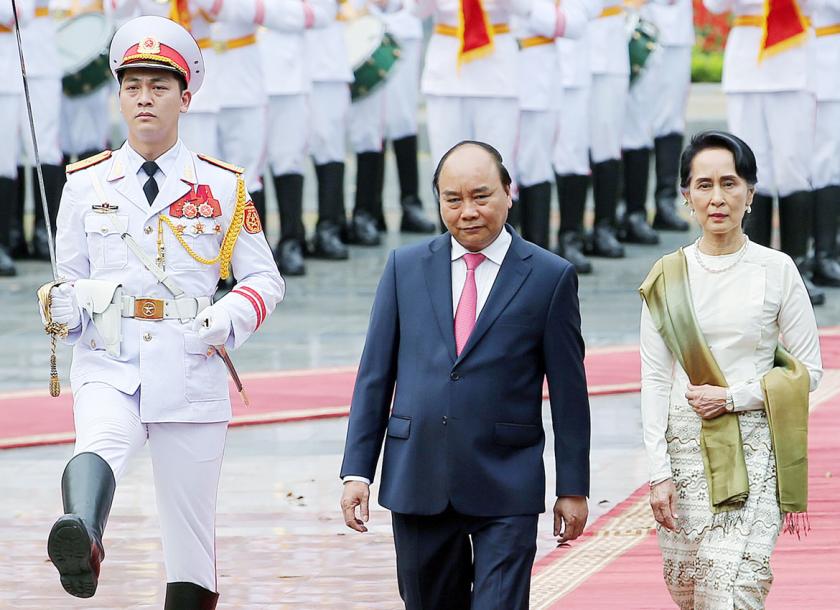Myanmar, Vietnam agree to raise bilateral trade over $1b by 2020
Myanmar and Vietnam have agreed to raise bilateral trade and have set a target of exceeding $1 billion in trading value by 2020.
The pact was made during State Counsellor Daw Aung San Suu Kyi’s two-day visit to the country on April 19-20, according to a statement from the Ministry of Foreign Affairs.
Currently, Vietnam is Myanmar’s ninth largest trading partner. Bilateral trade between Myanmar and Vietnam hit $830 million 2017-18, representing a 50 percent increase from the previous year, according to the Ministry of Commerce (MOC).
However, Myanmar currently runs a trade deficit with Vietnam, with imports reaching $400 million in value in 2016-17 compared to exports, which totaled just $88 million in value during the same year.
For the ten months of 2017-18, Myanmar imports from Vietnam had surged to $490 million, with exports trailing at just $100 million in value.
Myanmar mainly imports capital equipment such as machinery and semi-finished goods from Vietnam, while its main exports are in agriculture.
Raising exports
Myanmar should aim to export more to Vietnam to narrow the trade deficit, U Zaw Min Win, chair of Union of Myanmar Federation of Chambers of Commerce and Industry.
“We need to make preparations to export more. The State must encourage and support small and medium enterprises that can export high quality agriculture products. The government should also grant as much capital as needed to support exports in the agriculture sector,” he said.
In fact, the MOC has already signed a memorandum of understanding with the Vietnam Ministry of Agriculture and Irrigation to raise exports of Myanmar agricultural produce to Vietnam, said U Khin Maung Lwin, assistant permanent secretary at the MOC.
Under the MOU, Vietnam is now buying Myanmar beans and pulses, rubber and corn. Vietnam also buys livestock-related products such as animal feed from Myanmar.
However, as Vietnam is already the third largest global producer of rubber, “there is no way Myanmar can export more of the product to it,” said U Khine Myint, Secretary of Myanmar Rubber Planters and Producers Association. As such, Myanmar must focus on raising the quality of its other products for export purposes.
For now though, traders are skeptical of achieving the $1 billion bilateral trade target within the next two years. “We have mainly agricultural products as exports. Vietnam’s major exports are also in agriculture. It won’t be easy for us to export more agriculture products to Vietnam. Meanwhile, imports will only rise,” said U Soe Tun, a local businessman.
Vietnam is gradually changing to an industrialized country and they have become capable to produce cycles and industrial raw materials and thus more import from Vietnam is likely, one businessman U Soe Tun said.
Rising FDI
Still, foreign direct investments from the Vietnamese appear to be on the rise. In fact, Vietnam is among the seven largest investors in Myanmar, with total registered investments amounting to $2.1 billion in 2017. It is currently also the second biggest ASEAN investor in Myanmar.
Last month, Vietnamese company Eurowindow, which makes doors and facades for buildings like office towers and apartments, announced plans to invest up to $120 million to build two factories in Myanmar.
The Vietnamese have also invested in MyTel, Myanmar’s fourth telecommunications operator. Viettel, which is owned by Vietnam’s Defence Ministry, now holds a 49 pc stake in the joint venture, in which Star High Public Co and Myanmar National Telecom Holding Public hold 28 pc and 23pc, respectively. Viettel said last year it would invest $1.5 billion for 7,200 base stations to build a 4G network in Myanmar.
Source: https://www.mmtimes.com/news/myanmar-vietnam-agree-raise-bilateral-trade-over-1b-2020.html


 Thailand
Thailand




